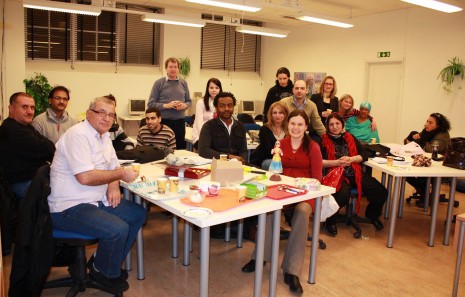
Even long before moving to Sweden, I have heard only horror stories about the courses in Swedish language that the Swedish government provides for immigrants. SFI, which is the acronym for svenska för invandrare, i.e. Swedish for immigrants, is supposed to provide a basic-level knowledge of Swedish, and is, as such, a great tool to integrate newcomers into the Swedish system.
Upon your first arrival to the course, you are supposed to do a test that determines the level of your knowledge in Swedish language. Based on the results of your test, you are classified into groups that are on basic or advanced levels.
The horror with the course is that there are absolutely no selection criteria for grouping immigrants according to their educational background. Hence, regardless of your level of knowledge of the Swedish language, everybody is mixed together: doctors, scientists, teachers, cleaners, waiters, construction workers, housewives, etc. For some, learning a new language is a piece of cake, while for others the process takes time, especially if the characters that one had learned to write in are different from the European Latin. If you belong to the first group that finds learning a language easy, you might end up sitting staring at a wall a lot, because you find yourself having finished your task ten minutes ahead of others in the group. So, out of three hours of your evening course that you come to attend after an eight-hours day at work, about a half of it might be wasted on waiting.
But not all is dark on the SFI horizon. Having lived in different countries around the world, I consider myself very fortunate to have the opportunity to be surrounded by people coming from various cultural and ethnic backgrounds. Hearing a story from a Somali woman about what she went through and how she ended up in Sweden is not something one hears every day. It gets then even more rewarding observing the joy on her face when she gets reassurance that the exercise in Swedish she just finished was correct. Or, hearing about adjusting to cultural differences from an Argentinean man who was sent by his company at home to work for a sister company in Sweden. Or learning about how difficult it is for a Thai woman to go back to Thailand and explain to her family why she is still unmarried to a Swedish man she lives with. Or getting to know about the feelings of a Tunisian young man about the revolution in his country that sparked similar events in the rest of the Middle East. Examples are many, and all are equally incredible.
So, in spite of the slow pace, attending SFI courses absolutely has its great advantages. This is particularly the case when you are lucky enough, like I am, to have a great teacher who sees your potential and gives you additional and more demanding assignments that not only keep you busy, but also make you feel that you are learning something new every time you attend the class. You never know, maybe I’ll be brave enough to write my next blog in Swedish.


